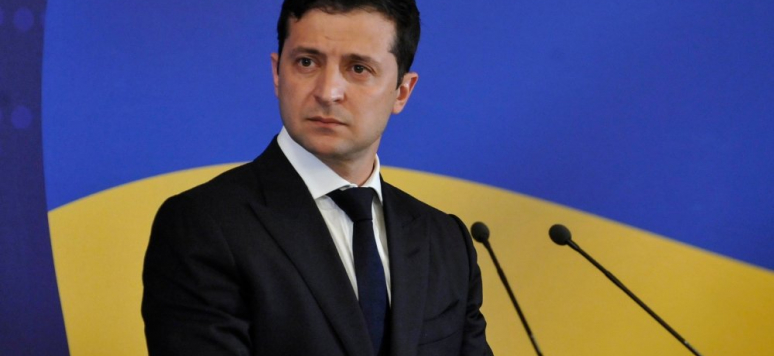L'Ifri dans les médias - President Zelensky’s Increasingly Critical Stance toward the West

After the recent intensification of dialogue between official Kyiv and President Biden’s administration, in the wake of the rising threat to Ukraine posed by Russia and in anticipation of President Biden’s visit to the UK and EU, President Volodymyr Zelensky and his team began sharpening their rhetorical stance toward Ukraine’s Western partners.
The pivot toward a more critical stance became clear at a press conference on May 20, 2021, at which President Zelensky discussed the lessons of the first two years of his presidency. When he touched on U.S. failure to block further construction of the Russian-built natural gas pipeline Nord Stream 2, designed to bypass Ukraine’s facilities and deliver energy supplies directly to the EU, he characterized it as a “grave political error,” saying, “It would be a loss for the United States, and I believe it would be President Biden’s personal loss. . . . It would mark a serious geopolitical victory for the Russian Federation and a new redistribution of spheres of influence.” He also expressed concern over the upcoming Biden–Putin summit , fearing that the U.S. administration’s decision not to sanction the Russian company overseeing the pipeline would be viewed by the Kremlin in a positive light.
The list of critics of the West grew with the addition of Oleksiy Danilov, secretary of Ukraine’s National Security and Defense Council. On June 4, 2021, Secretary Danilov expressed the view that Germany and France were “partially responsible” for the occupation of Crimea and parts of Georgia, since Russia felt able to attack Georgia and Ukraine with impunity after these countries declined to provide Ukraine with a NATO Membership Action Plan in 2008. He added, “Should Germany and France be responsible for this? I think they should.”
Finally, President Zelensky repeated his and his team’s criticism in an interview with Axios published several hours before the phone conversation with President Biden on June 7, 2021.
In my opinion, these statements signal both official Kyiv’s growing concerns over its alliance with its Western partners and a quest for a new policy toward the United States and the EU.
How were these statements perceived by Ukraine’s Western partners? I put this question to international relations experts in the United States, France, and Germany. Their answers follow.
Tatiana Kastoueva-Jean (Paris)
President Zelensky's critical stance toward the West has not been the subject of any official comment and is ignored by public opinion in France. The main reason is France’s relationship with Russia, which is based on the dual principle of "firmness and dialogue." On the one hand, France has imposed sanctions on Russia, and its authorities strongly condemn Russia’s “authoritarian drift” (in the words of Foreign Minister Jean-Yves Le Drian), the poisoning of Aleksei Navalny, the cyber and information operations, etc. On the other hand, France wants to keep the dialogue open and takes care not to cross what is perceived as “red lines” for the Kremlin.
There is a consensus that direct military support to Ukraine or a push for NATO and EU membership could be a casus belli for Russia. In the short term, France is not in favor of Ukraine joining these two organizations, a subject that President Zelensky tackled openly during his visit to Paris in April 2021. The French president has not publicly expressed his reluctance to weaken his Ukrainian counterpart, either internally or vis-à-vis Russia; rather, this subject was simply absent from the press release published by the Elysée on the occasion of the Ukrainian president’s visit in April. The same press release reiterated France's strong support for the unity and sovereignty of Ukraine, the development of bilateral relations in all fields, and the Minsk agreements. But the “spirit of Brégançon” (a kind of French “reset” with Russia), despite the lack of tangible political and strategic results, remains alive in Paris.
[...]
> Find the complete article on the Wilson Center [1]
